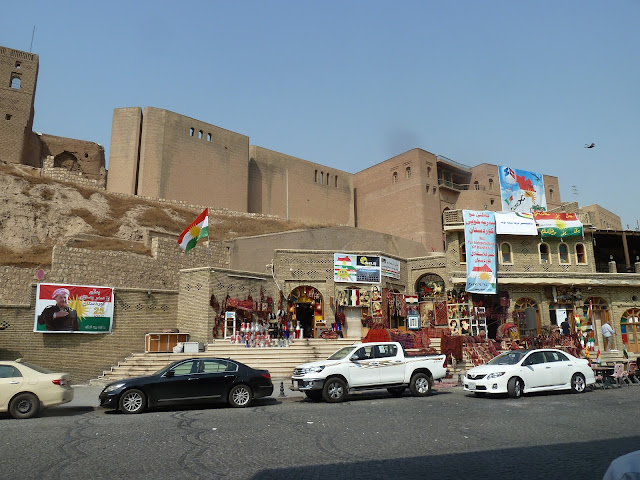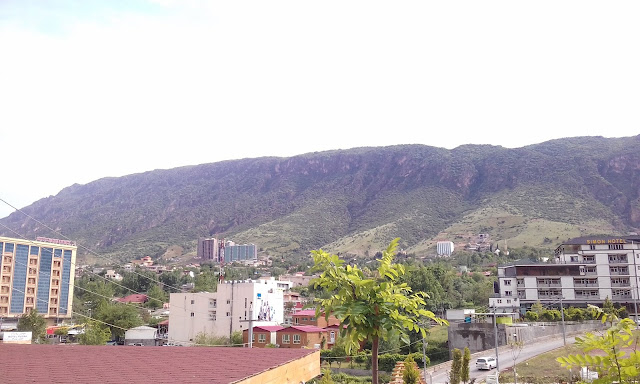On faith
I'm currently living in quite a strange world. Actually just about everyone on earth is - see global politics, the ineffability of the universe, the rise of technology, etc. - but this particular one is just a bit stranger for me than usual. I, a relatively (I hope) innocuous agnostic am now in Iraqi Kurdistan - a place where religion is of the utmost importance. The particular peculiarities of the religious make-up of this little corner of Iraq come from a juxtaposition of the some of the most fervently, traditionally Christian people in the world with some of the most deeply Muslim. This divide seems to be deepened in the region by great cultural and linguistic differences. The majority of the Muslims, on the one hand are Kurdish meaning they speak an Indo-European language, which is most closely related to Farsi. Whilst the Christians are mostly Assyrian, Chaldean or Iraqi Arab and (mostly) either speak Surat or Assyrian depending on whether they are of the Chaldean Catholic Church or the Eastern Church. Both groups of Christians claim that their language and culture are descendant of the Aramaic - the language that Christ would have spoken.
Both of these groups have faced serious persecution by people more powerful than them for centuries, perhaps millennia. Most recently this has been at the hand of the Baghdad government and Daesh. The Kurdish people who have longed for a homeland may be on the brink of getting it, at least in Northern Iraq. And in amongst this minority ethnic group are small islands of Christians. A minority within a minority.
The ISIS threat in this part of the country is non-existant, whilst the Kurdistan Autonomous Region's recent independence referendum has caused conflict between the Baghdad and Erbil's government, their respective foot soldiers being Iraqi Militias and the Peshmerga, who were fighting on the same side not so long ago. Now there is a new internal refugee crisis in Iraq.

What really surprises me about all this is that despite Kurdistan being touted as a democratic, free-thinking, secular, dare I say "Western" oasis in the Middle East, tension and fear in the Christian communities are still high. Despite being surrounded by Muslim Kurds, (who as far as I can tell mean them no harm) the Christians are forever wary of their neighbours. It is not far from being reminiscent of the Western fear of refugees from this very same region. I frequently hear remarks about Muslims that would be considered religious profiling in the West. They claim that the Islamic faith is one of war, and that Muslims are taught to deceive by the Quran and the Imams.
The identity of the Iraqi is made up by a large measure of religion, faith, call it what you will. This quality is discrete in its nature, you are Muslim or you are Christian, Shia or Sunni, Catholic or Orthodox. How does one go about attaining this label? You are born into it. Your identity card says it. As you might guess, this leads to some rather difficult conversations when locals encounter me. How do I respond to the question "What is your religion?" My painfully individualistic culture allows, in fact demands for that question to be answered in an essay, not just option A, B, C or D. I am a beautiful snowflake that matters dammit!
I'm not saying the culture here is wrong, culture cannot be wrong in my eyes. In fact, I am unsure how healthy our rampant individuality and self-praise is. And yes, I do realise the inherent irony of my writing this in my own personal blog where I don't have to listen to anyone's opinions but mine. Nevertheless, this collective identity does hold importance and power. These people are united in their beliefs. They know - they don't just just believe that they know - that there is a God outside of them with a plan and that plan pertains exactly to their particular subset of faith. Their moral expectations, life choices, view of the world is all based on this. Of course this is nothing unusual, but look what you can do with a collective religious identity.
This summer I was in a different part of the world, with a different set of people, with drastically different sets of views to those I am currently surrounded with. I lived for a couple of months in a Christian community in Prague, in Maggie - the Jonesberry's expedition vehicle with my then-partner and her tribe. Their particular brand of faith is the closest thing I have ever found to what I would call true Christianity (I thought, see later). I know how presumptive that sounds, but bear with me. Why do I hold such a high opinion of this rag-tag openly-broken gaggle of hippies and artists? Because they are true to their beliefs, and their beliefs are (for lack of a better word to describe that which one believes without objective evidence) rational. They have no detailed contract or creed which meticulously details what it means to be one of them, but basic precepts are followed consistently without need for papal enforcement or intervention. Firstly, love your neighbour. Love the adulterer, the thief, the nudist hippy, even the people who have hurt you the most. But that means you have to be there, without judgement with them in their darkest times. '...I have become all things to all people...' Secondly, live with abandon - money is not a worthwhile goal, people are. In my attempts to understand the inner-workings of their faith, I asked some hard questions:
Both of these groups have faced serious persecution by people more powerful than them for centuries, perhaps millennia. Most recently this has been at the hand of the Baghdad government and Daesh. The Kurdish people who have longed for a homeland may be on the brink of getting it, at least in Northern Iraq. And in amongst this minority ethnic group are small islands of Christians. A minority within a minority.
The ISIS threat in this part of the country is non-existant, whilst the Kurdistan Autonomous Region's recent independence referendum has caused conflict between the Baghdad and Erbil's government, their respective foot soldiers being Iraqi Militias and the Peshmerga, who were fighting on the same side not so long ago. Now there is a new internal refugee crisis in Iraq.

What really surprises me about all this is that despite Kurdistan being touted as a democratic, free-thinking, secular, dare I say "Western" oasis in the Middle East, tension and fear in the Christian communities are still high. Despite being surrounded by Muslim Kurds, (who as far as I can tell mean them no harm) the Christians are forever wary of their neighbours. It is not far from being reminiscent of the Western fear of refugees from this very same region. I frequently hear remarks about Muslims that would be considered religious profiling in the West. They claim that the Islamic faith is one of war, and that Muslims are taught to deceive by the Quran and the Imams.
The identity of the Iraqi is made up by a large measure of religion, faith, call it what you will. This quality is discrete in its nature, you are Muslim or you are Christian, Shia or Sunni, Catholic or Orthodox. How does one go about attaining this label? You are born into it. Your identity card says it. As you might guess, this leads to some rather difficult conversations when locals encounter me. How do I respond to the question "What is your religion?" My painfully individualistic culture allows, in fact demands for that question to be answered in an essay, not just option A, B, C or D. I am a beautiful snowflake that matters dammit!
I'm not saying the culture here is wrong, culture cannot be wrong in my eyes. In fact, I am unsure how healthy our rampant individuality and self-praise is. And yes, I do realise the inherent irony of my writing this in my own personal blog where I don't have to listen to anyone's opinions but mine. Nevertheless, this collective identity does hold importance and power. These people are united in their beliefs. They know - they don't just just believe that they know - that there is a God outside of them with a plan and that plan pertains exactly to their particular subset of faith. Their moral expectations, life choices, view of the world is all based on this. Of course this is nothing unusual, but look what you can do with a collective religious identity.
This summer I was in a different part of the world, with a different set of people, with drastically different sets of views to those I am currently surrounded with. I lived for a couple of months in a Christian community in Prague, in Maggie - the Jonesberry's expedition vehicle with my then-partner and her tribe. Their particular brand of faith is the closest thing I have ever found to what I would call true Christianity (I thought, see later). I know how presumptive that sounds, but bear with me. Why do I hold such a high opinion of this rag-tag openly-broken gaggle of hippies and artists? Because they are true to their beliefs, and their beliefs are (for lack of a better word to describe that which one believes without objective evidence) rational. They have no detailed contract or creed which meticulously details what it means to be one of them, but basic precepts are followed consistently without need for papal enforcement or intervention. Firstly, love your neighbour. Love the adulterer, the thief, the nudist hippy, even the people who have hurt you the most. But that means you have to be there, without judgement with them in their darkest times. '...I have become all things to all people...' Secondly, live with abandon - money is not a worthwhile goal, people are. In my attempts to understand the inner-workings of their faith, I asked some hard questions:
- Who is God? The older I get, the less I know.
- What does the Bible say to you? The New Testament, at least says - be poor, don't judge people.
Were these answers a result of pragmatism - not wanting to offend? I don't think so. They're not easy questions to answer, but the answers given were simple and heartfelt. And no, I wasn't convinced - perhaps if I'd stayed longer with them I would have been re-re-re-born. But it did let me see that faith can be so truly intertwined with desire for purity of heart. And it can work. I started to question my ability to truly love others while lacking a faith, and I still ask that question sometimes.
Of course, this idea of works-by-faith should come as no surprise to me - I was raised by Baptists whose work with refugees in the UK was done with love and passion which came from their faith. They are genuine givers, lovers and followers of their God. I do my best to respect that. The same goes for the Christians here who are quietly desperate to remedy the crisis of my absent belief, and to block my route to Mecca. They love each other and those just outside of their small, tight-knit communities - including the Muslims that they fear. But the fear is still there, and that bothers me me.
So, where does this leave me? Somewhere in the uncomfortable cross-roads of faith and secularism. I have become the devil's perpetual advocate on all sides. Am I painfully inoffensive? I guess so. This world is crazy and confusing, and I'm certain I'll never find the truth of it all.
The inspiration from this post came partly from Phil Wyman's book Burning Religion. Check out his site.



Comments
Post a Comment